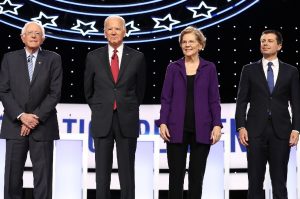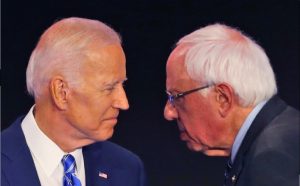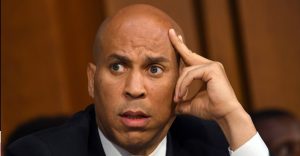by Daveda Gruber:
It appears that there is no clear frontrunner in the Democratic race for the leadership of the party.
The Iowa caucuses are less than six weeks away and there is no outright favorite. In more than a half of a century we have not seen a convention that goes beyond a first ballot but we may see it happen.
If this first ballot does not work out, and it certainly looks like that is a possibility, we will see a brokered or contested convention.
The last time that either of the major party nominating conventions went past a first ballot was 1952. In that year Adlai Stevenson won the Democratic nomination on the third ballot.
Kathy Sullivan, the Democratic National Committee member from New Hampshire, recently said, “It could happen, it would be exciting to see it go past the first ballot because it would be so unusual.”
Sullivan added, “It’s been a long, long, long time since there’s been a second ballot at a Democratic convention.”
Even if the possibility of a brokered convention is not a strong possibility, conditions in this race could possibly lead to no candidate holding a clear majority of delegates when they head into the July Democratic convention in Milwaukee.
Here’s where the electoral college comes into play. We’ve all heard about superdelegates. These delegates are the party elders and insiders. But the superdelegates were stripped of their power in the 2016 primary battle. After all, Hillary Clinton was destined to win, if only in the minds of the Democrats.
This upcoming election does not have a presumed frontrunner so the superdelegates could become important and their powers would be activated.
They would be free to boost the candidates of their choosing. Their choice is not an easy task. Who could possibly beat the incumbent, President Trump? None, as far as I can see.
The top tier consists of four candidates. They are former Vice President Joe Biden, Sens. Bernie Sanders of Vermont and Elizabeth Warren of Massachusetts, and South Bend, Ind., Mayor Pete Buttigieg.
The donors to the Democrats are a diverse group. Sanders, Warren and even a long shot candidate like tech entrepreneur Andrew Yang could see their campaigns funded by people-powered donations into the primary process.
Online contributions are interfering with the once powerful wealthy donors who still back more establishment candidates and those candidates would be Biden or possibly Buttigieg.
Former New York City Mayor Mike Bloomberg and environmental advocate Tom Steyer are pouring hundreds of millions of their own money into their own campaigns. That alone could keep them going if they can manage to hang in the race long enough.
If three or four contenders are still standing when heading into April, they would all fall short of the 1,919 delegates that are needed to clinch the nomination on the first ballot.
Sullivan explained, “You’d have to have a situation where multiple candidates come out of the first four states with wins. You’d go into Super Tuesday and have some candidates concentrating in certain states, others in other states, because it’s very expensive to run in all the states on Super Tuesday. Not all the candidates can afford to do that.”
She went on to say, “So if we come out of Super Tuesday with no clear leader and then it becomes a state-by-state contest and then we end up in New York towards the end of April. If after that point we still don’t have [a clear leader], then yes, it goes to the convention and conceivably a second ballot.”
Democratic governors, senators, representatives, former high-ranking lawmakers and leading party officials, who make up the superdelegates, all backed their favorite candidate, Clinton, in 2016.
But after the 2016 election, the DNC pulled back the influence of superdelegates because of the anger of Sanders and his army of progressive supporters.
Now, the superdelegates are only unbound if the convention reaches a second round.
Then there is another scenario.
If one of the candidate gets strong in the early states, the nomination race could be over pretty fast.
In 2004 when then Sen. John Kerry of Massachusetts wrapped his nomination early.
If the battle between the candidates goes to a second ballot in Milwaukee, Sullivan maintains that we shouldn’t expect to see a repeat of the contested conventions from the history books.
Sullivan said, “People refer to brokered conventions, which leads you to think of people in smoke-filled rooms making deals, cutting deals. I don’t think you’re going to see deal-making going on because all these people [delegates] are free agents. It would be a very democratic process.”
A Democratic process? Is she suggesting that the 2016 process wasn’t? No, Clinton was the clear choice for everyone in the party even if they cheated Sanders out of it.
Unfortunately for them, they were all wrong. They backed their candidate without any thought that Trump would or could defeat their choice for president.
Personally, I believe Trump will be the winner no matter who the Democrats put up against him.
If I were a Democrat, which I am not, I’d be panicking about now.










